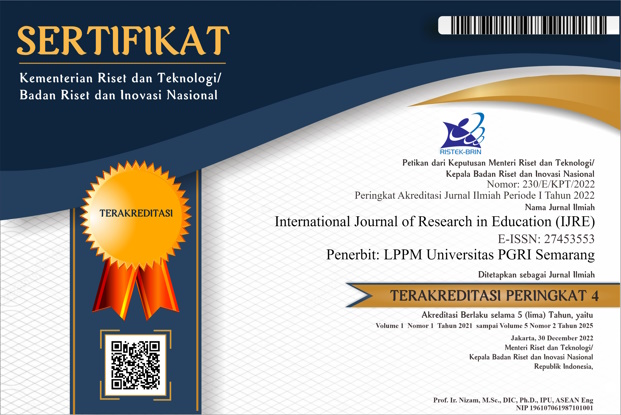The Impact of Islamic Religious Education on Students' Spiritual and Social Development: A Study at Universitas Muhammadiyah Semarang
DOI:
https://doi.org/10.26877/ijre.v5i1.1341Keywords:
Islamic Religious Education, spiritual quality, social quality, students, accidental samplingAbstract
In the era of globalization, students are expected to possess intellectual, spiritual, and social intelligence. Spiritual, and social intelligence to navigate complex societal challenges effectively. However, the role of Islamic Religious Education (PAI) in fostering these qualities, particularly in higher education, remains underexplored. This study examines the impact of PAI on students' spiritual and social qualities. This study bridges this gap by examining the effects of PAI on students' spiritual and social qualities. This study examines the impact of Islamic Religious Education (PAI) on improving students' spiritual and social qualities at the Faculty of Agricultural Science and Technology, University Muhammadiyah Semarang. The research employed a quantitative survey method using accidental sampling, involving 150 third-semester students who had completed the PAI course. Data were collected through a 12-item questionnaire and analyzed using descriptive analysis and t-tests. The results indicate that PAI learning significantly enhances students' spiritual quality, reflected in their understanding of religious teachings, frequency of worship, and ethical awareness. Social quality also showed significant improvement, as evidenced by increased participation in social activities, empathy towards others, and effective communication skills. All variables demonstrated a p-value of less than 0.05, indicating significant changes after the PAI learning. Although this study highlights the crucial role of PAI in shaping students' character, it has several limitations, such as its single-faculty focus, reliance on a specific questionnaire, and short-term observation, highlight the need for further research. Moreover, the study only observed short-term effects, suggesting the need for further research with
References
Abu Bakar, M., Umroh, K. A., & Hameed, F. (2023). Improving Quality Islamic Education for Today’s Generation. At-Tadzkir: Islamic Education Journal, 2(2), 118–128. https://doi.org/10.59373/attadzkir.v2i2.42
Adinda Khoirunnis, Putri, T., Putri, W., & Gusmaneli. (2023). Peran Pendidikan Agama Islam dalam Pembentukan Karakter Dan Kepribadian. UNISAN JOURNAL : Jurnal Manajemen & Pendidikan, 2(7), 9–16. https://journal-nusantara.com/index.php/PESHUM/article/download/2659/2192
Ainawa Kholilatul Nurizah, & Muhlasin Amrullah. (2024). Religious Character Formation Through Islamic Habituation in Primary Education. Indonesian Journal of Islamic Studies, 12(4). https://doi.org/https://doi.org/10.21070/ijis.v12i4.1741
Althof, S. V. F., & Fachrunnisa, O. (2022). The Role of Islamic Human Value and Personal Branding for Success Career in Millennial Muslim Generation. E-Academia Journal, 11(2), 117–129. https://doi.org/10.24191/e-aj.v11i2.20438
Ciptadi, M. T., Haris, A., & Ishomuddin. (2023). Islamic Education Material With a Sociological Approach. IMTIYAZ: Jurnal Ilmu Keislaman, 7(2), 168–182. https://doi.org/10.46773/imtiyaz.v7i2.834
Daengs, A., Istanti, E., & Kristiawati, I. (2022). Peran Timelimenes Dalam Meningkatkan Customer Satisfaction, Customer Loyalty Pt. Jne. Jurnal Baruna Horizon, 5(1), 1–7. https://doi.org/10.52310/jbhorizon.v5i1.71
Damayanti, M. I., Nursalim, M., & ... (2024). Analisis Penguatan Kecerdasan Spiritual Mahasiswa PGSD FIP UNESA melalui Aktivitas Menulis Jurnal Syukur. Didaktika: Jurnal …, 13(1), 963–980.https://www.jurnaldidaktika.org/contents/article/view/497%0Ahttps://www.jurnaldidaktika.org/contents/article/download/497/331
Evi Gusliana, & Nurlela. (2022). Islamic Religious Education in Shaping Character in Higher Education. Al-Ibda: Jurnal Pendidikan Guru Madrasah Ibtidaiyah, 2(02), 12–17. https://doi.org/10.54892/jpgmi.v2i02.244
Hambali, D. S., & Asyafah, A. (2020). Implementasi pembelajaran pendidikan agama islam di pendidikan tinggi vokasi. Jurnal Kajian Pendidikan Umum, 18(2), 8–19. https://ejournal.upi.edu/index.php/SosioReligi/article/download/28727/12956
Heti Aisah, Qiqi Yulianti Zaqiah, A. S. (2021). Jurnal pendidikan Islam. Jurnal Pendidikan Islam, 1(1), 128–135. https://doaj.org/article/71f4274e4bdb4f8c8b98e653d7164833
Holt-Lunstad, J., Smith, T. B., & Layton, J. B. (2010). Social relationships and mortality risk: A meta-analytic review. PLoS Medicine, 7(7). https://doi.org/10.1371/journal.pmed.1000316
Ilham, I., Kaharuddin, K., Ferdiansyah, F., & Nasaruddin, N. (2024). Model of Cultivating Student’s Character Through the Integration of Islamic Education. Al-Hayat: Journal of Islamic Education, 8(2), 699. https://doi.org/10.35723/ajie.v8i2.565
Kasman, A. (2024). Landasan Spiritual Keilmuan Dalam Pendidikan Islam. At-Ta’Dib: Jurnal Ilmiah Prodi Pendidikan Agama Islam, 16(1), 65–75. https://doi.org/10.47498/tadib.v16i1.3009
Khadavi, J., Nizar, A., & Syahri, A. (2023). Increasing The Effectiveness of Islamic Religious Education Learning in Building Students’s Spiritual Intelligence. International Journal of Islamic Thought and Humanities, 2(2), 201–209. https://doi.org/10.54298/ijith.v2i2.104
Khasanah, U. (2023). Islamic Education as a Foundation of Character : a Case Study of the Formation of Noble Morals in Students Received : Revised : Accepted : JOURNAL OF ISLAMIC EDUCATION, 8(2). https://doi.org/https://doi.org/10.52615/jie.v8i2.541
Kusuma, D. T., Hambali, A., & Suhartini, A. (2023). The concept of thinking and dzikir as an Islamic education process. Atthulab: Islamic Religion Teaching and Learning Journal, 8(2), 238–251. https://doi.org/10.15575/ath.v8i2.27906
Mohd Yusoff, M. Z., Hamzah, A., Fajri, I., Za, T., & Yusuf, S. M. (2022). The effect of spiritual and social norm in moral judgement. International Journal of Adolescence and Youth, 27(1), 555–568. https://doi.org/10.1080/02673843.2022.2156799
Musnandar, A., & Ubaidi, A. (2022). Islamic Values on Soft Skills. Jihbiz : Jurnal Ekonomi, Keuangan Dan Perbankan Syariah, 6(2), 102–116. https://doi.org/10.33379/jihbiz.v6i2.1645
Nargis Mushtaq Ahmed, & Abdul Qader Haroun. (2022). ISLAMIC STUDIES AT UNIVERSITY LEVEL: ITS IMPORTANCE AND ROLE IN PROMOTING ISLAMIC ETHICS IN SOCIETY. The Scholar Islamic Academic Research Journal, 8(1), 2022. https://doi.org/1arabic4issue1https://doi.org/10.29370/siarj/
Puspitasari, N., Relistian. R, L., & Yusuf, R. (2022). Peran Pendidikan Agama Islam Terhadap Pembentukan Karakter Religius Peserta Didik. Atta’dib Jurnal Pendidikan Agama Islam, 3(1), 57–68. https://doi.org/10.30863/attadib.v3i1.2565
Rokhimawan, M. A., Aulia, M. G., Rifai, I., & Azahro, S. L. (2023). The Correlation between Understanding the Independent Learning – Kampus Merdeka (MBKM) Curriculum with the Fulfilment of PAI Student Learning Rights. Jurnal Pendidikan Agama Islam, 20(2), 279–292. https://doi.org/10.14421/jpai.v20i2.8049
Sofa, A. R., Mundir, H., & Ubaidillah, H. (2023). Learning Islamic Religious Education Based on Spiritual and Emotional Intelligence to Build the Morals of Zainul Hasan Genggong Islamic University Students. International Journal of Educational Narratives, 2(1), 42–47. https://doi.org/10.70177/ijen.v2i1.609
Sugiyono. (2013). Metodologi Penelitian Kuantitatif, Kualitatif dan R & D (19th ed.). Alfabeta.
Suraji, R., & Sastrodiharjo, I. (2021). Peran spiritualitas dalam pendidikan karakter peserta didik. JPPI (Jurnal Penelitian Pendidikan Indonesia), 7(4), 570. https://doi.org/10.29210/020211246
Triantiani, M., Fachrunnisa, O., & Adhiatma, A. (2022). Exploring Islamic Human Values on Self-Regulation for Career Adaptability among Muslim Millennials. E-Academia Journal, 11(1), 14–30. https://doi.org/10.24191/e-aj.v11i1.18268



